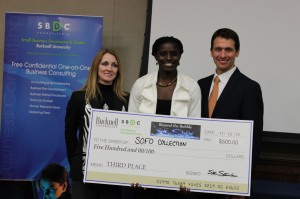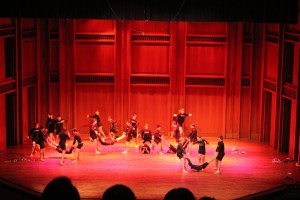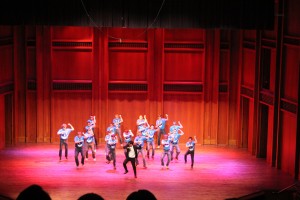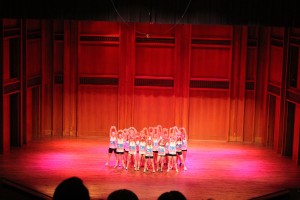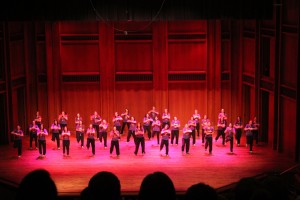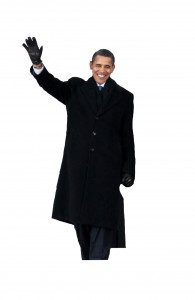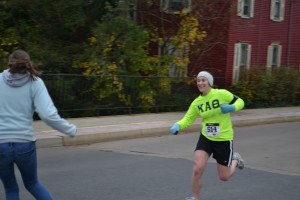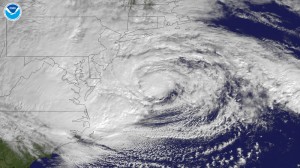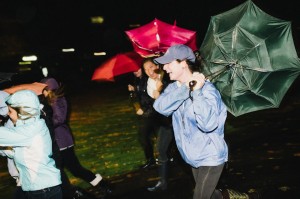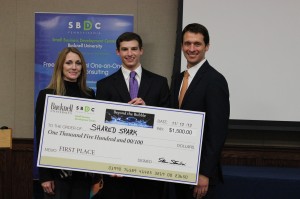
Winner Bryan Richman ’14 with his grand prize. LEFT TO RIGHT: Brenda Holdren, Bryan Richman ’14, Steven Stumbris.
Jen Lassen
News Editor
In the spirit of entrepreneurship, six different student groups recently set out to break the “Bucknell Bubble.”
On Nov. 12, the University “Beyond the Bubble” 2012 Business Pitch Competition final round dinner and awards ceremony took place in the Center Room of the Elaine Langone Center.
This event, hosted by the Small Business Development Center (SBDC) and supported by the generosity of James Ferguson ’73 and Bob Esernio ’80, featured six finalists chosen from 23 competing teams after a preliminary round of presentations.
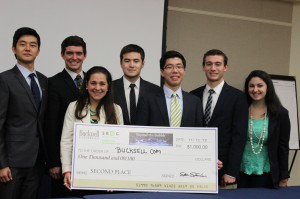
Second place winners of the Beyond the Bubble business pitch competition, LEFT TO RIGHT: Zhihao Ren ’14, Jesse Dondero ’13, Nicole Papaleo ’14, Alik Kurbanov ’14, Haokang Zhu ’14, Patrick Bucaria ’15, and Elise Perazzini ’15.
The first place prize, $1,500 and a year’s worth of desk space in the Entrepreneurs Incubator located in the DeWitt Building downtown, went to Bryan Richman ’14 for “Shared Spark,” a unique online relationship platform that helps college students “escape the ‘friend zone’ with one another.”
“I was pretty surprised; I honestly didn’t believe I had what it took. But, I believed, and I’m extremely excited about being able to set out what I achieved to do in the first place,” Richman said.
Second place and $1,000 went to Zhihao Ren ’14, Elise Perazzini ’15, Patrick Bucaria ’15, Alik Kurbanov ’14, Thomas Zhu ’14, Jesse Dondero ’13, Nicole Papaleo ’14, Mahilet Oluma ’13 and Samuel Schlitzer ’14 for “Buck$ell.com,” a college goods and services trading website; third place and $500 went to Felicia Mgbada ’13 for “SOFO Collection,” a Nigerian fabric fashion company.
“I am so proud of our team. We worked so hard to get where we are. Yes, we didn’t get first place, but we definitely put so much time and effort into this. This is just the beginning,” Papaleo said.
Other finalists included Alexander Meijer ’14 for “Bitcoin Mining Venture,” Davon Bailey ’13 and Adriana Zermeno ’14 for “Upper Class Productions” and Adedotun Odewale ’13 and Eric Stillwell ’14 for “Wilderness Expedition Team.”
Prior to the event, all six finalists presented their ideas to a panel of judges in a five-minute business pitch presentation. Finalists were judged on innovation, clarity, comprehensiveness, feasibility and “wow” factor.
The six judges included George Burman ’74, James Ferguson ’73, Michael Hinchman ’79, Yoshi Maisami ’01, John Patterson ’84 and F. Kyle Shoeneman ’06, all University graduates and accomplished businessmen.
“It’s great to see this type of program here at Bucknell and also great to see the students taking advantage of it. It was fun to see the presentations, but I enjoyed getting some one-on-one time with the students,” Patterson said.
“I’m not sure there was much of an entrepreneurial spirit when I was here at Bucknell; we were all much more career-oriented in those days. I think [entrepreneurship] is something that the University should spend a lot of time and energy encouraging,” Ferguson said.
